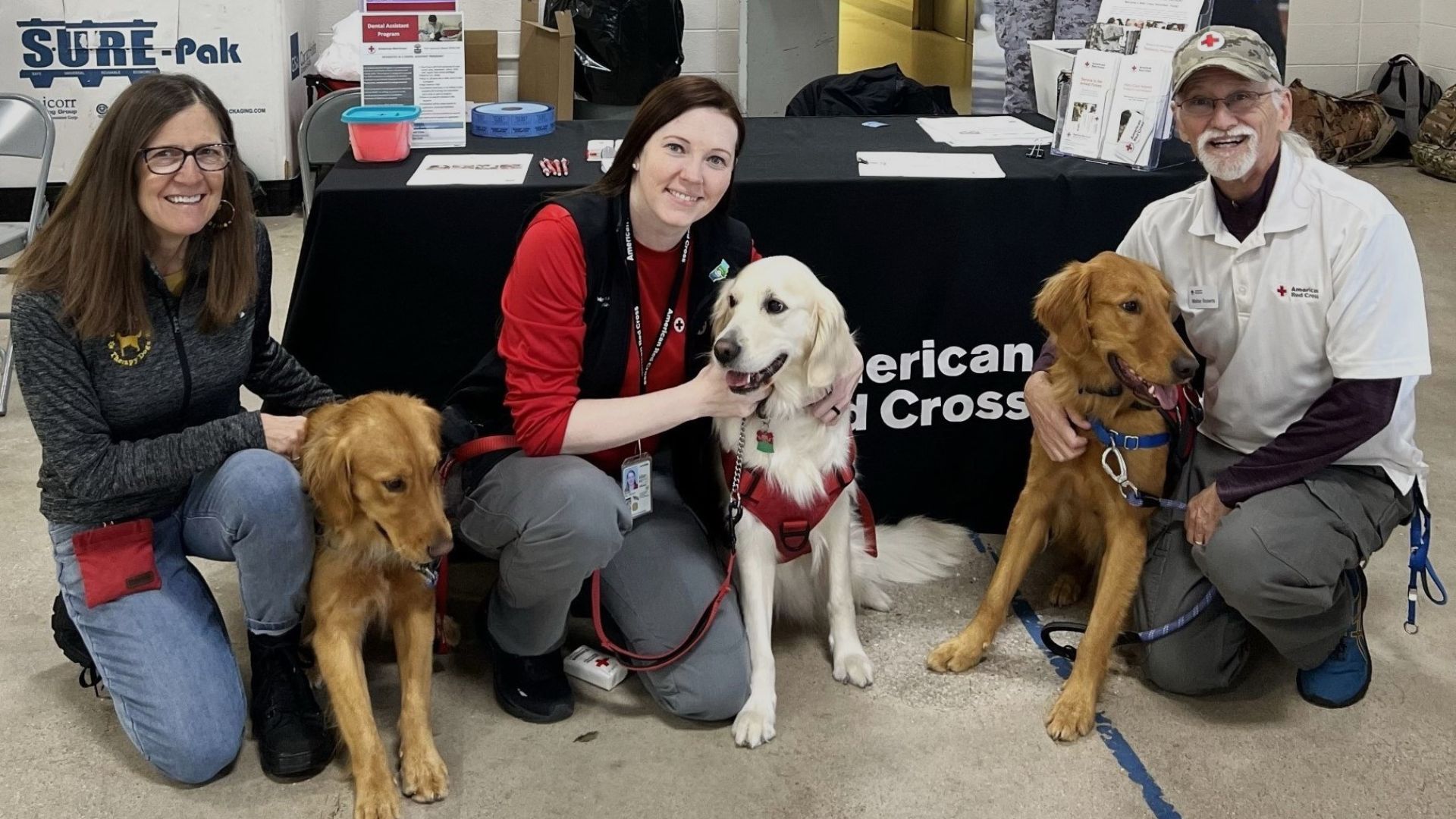
Members of the Red Cross Animal Visitation Program at a community event. From left, Laurie Roberts, Jill Eaves, and Walter Roberts with their dogs. Jill is Service to the Armed Forces program manager for the Missouri-Arkansas Region and Laurie and Walter are volunteers working with the Animal Visitation Program.
By: Carl Manning, American Red Cross
Sometimes all it takes is a wagging tail and a furry head leaning against a person to make them realize there can be joy in the world, despite how they might feel or what they’ve endured.
Jill Eaves, Service to the Armed Forces (SAF) program manager for the American Red Cross of Missouri and Arkansas, and her volunteer partner, Walter Roberts, have worked to get the SAF Animal Visitation Program up and running in the two-state region.
The program brings trained animal visitation teams to military treatment facilities, installations and community events honoring service members. These visits offer emotional support to military personnel and their families.
“Our programs provide an opportunity for people to open up and be more comfortable,” Jill said. “It’s so rewarding to see. We have great hopes for this program and the response has been great.”

Red Cross volunteer Walter Roberts and his dog Iko are members of the Service to the Armed Forces Animal Visitation Program that works with members of the armed forces, their families and veterans.
Walter works as a Disaster Mental Health volunteer and has three golden retrievers in the SAF program which he says bring joy to those who need it most.
“The response always has been overwhelmingly positive,” Walter said. “People like to engage with the dogs. They find the dogs are not as judgmental and accept people for who they are. The dogs are used in various SAF Resiliency Workshops for programs designed to do such things as managing stress and easing symptoms related to trauma for armed forces members, veterans and their families.”
Jill, who has an English cream golden retriever named Emma, said the program was recently approved for use at the Fort Leonard Wood, Missouri hospital where the teams regularly visit patients and work with the family advocacy department. The dogs and their handlers interact with patients treated for various illnesses including those with problems such as PTSD. They also provide comfort to families and military dependents working through hardships and crisis.
“We bring the dogs to work with children. We give them a little fur love and it helps put the kids at ease during a stressful time,” she said. “Interacting with the dogs can be a great stress reliever. It’s proven that humans interacting with animals lowers the blood pressure and anxiety levels,” Jill elaborated. “Right now, we are working with dogs but there are other animals that can qualify.”

Jill Eaves, Service to the Armed Forces program manager for the Missouri-Arkansas Region, and her dog Emma are members of the SAF Animal Visitation Program.
Walter said the dogs in the Animal Visitation Program should not be confused with therapy animals which are specifically trained to assist individuals with particular medical conditions or needs. Rather, those in the Animal Visitation Program provide opportunities for motivation, education or recreation to enhance the well-being of people. The dogs can be any breed, even a mutt, but they must have gentle temperament and get along with other animals, Walter explained. They also must pass a training course and be certified as part of the Animal Visitation Program.
Walter said one thing he has learned is to let the dog take the lead.
“The dogs know how to read the room. They can pick up on tensions and are often perceptive to those who would like to engage but are too shy or reserved to do so,” he said. “They will often approach cautiously, touching them with their nose or wagging their tail.”
Recently, Jill and Emma visited residents at the Missouri Veterans Home in Mt. Vernon. “You see these gruff veterans there and they were just melting and talking to the dog and having a great time,” she said. “It’s good to know we touched somebody’s heart and made their day.”
To support programs such as these, consider making a financial contribution to the American Red Cross by clicking here.
Support all the urgent humanitarian needs of the American Red Cross.
Find a drive and schedule a blood donation appointment today.
Your time and talent can make a real difference in people’s lives. Discover the role that's right for you and join us today!